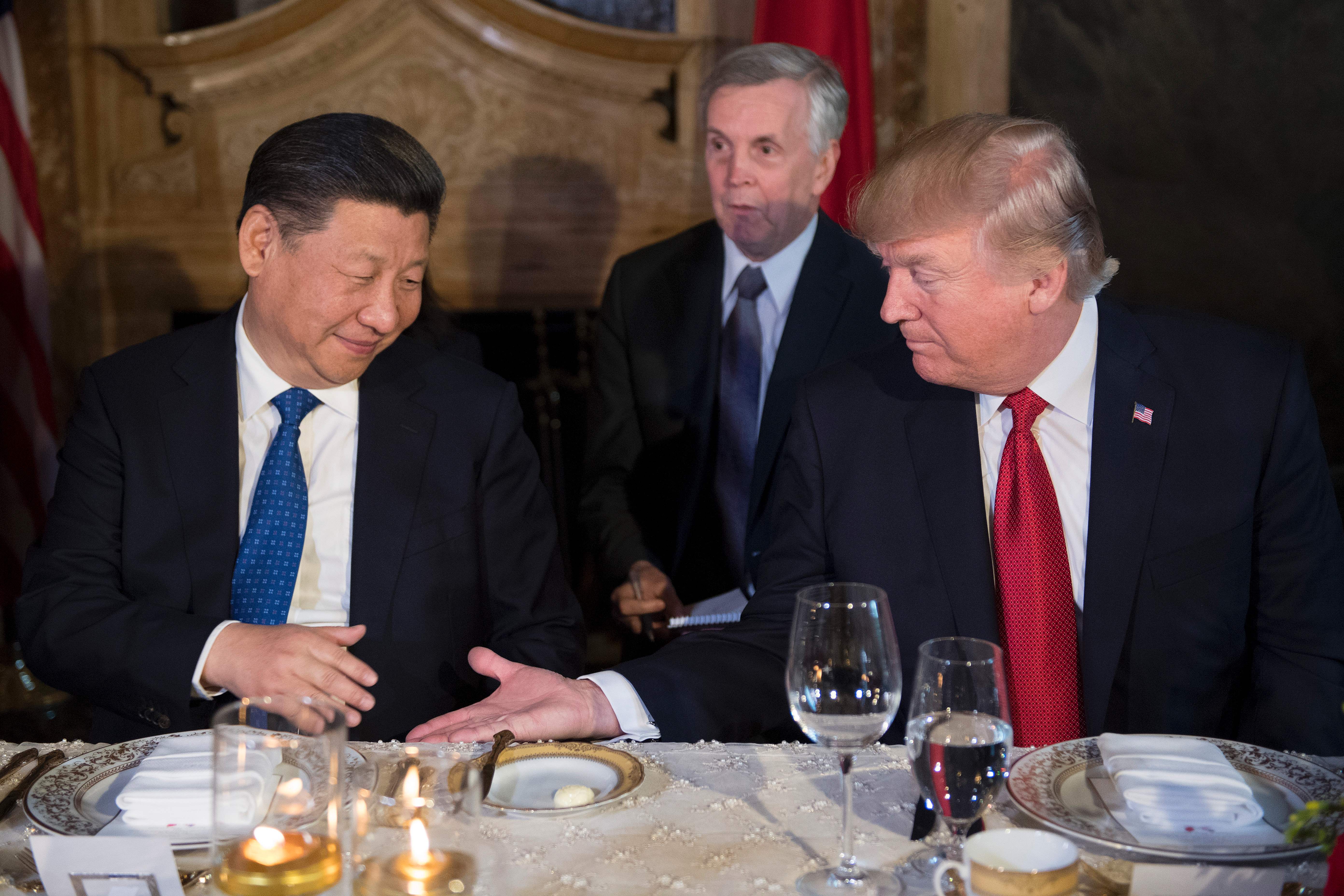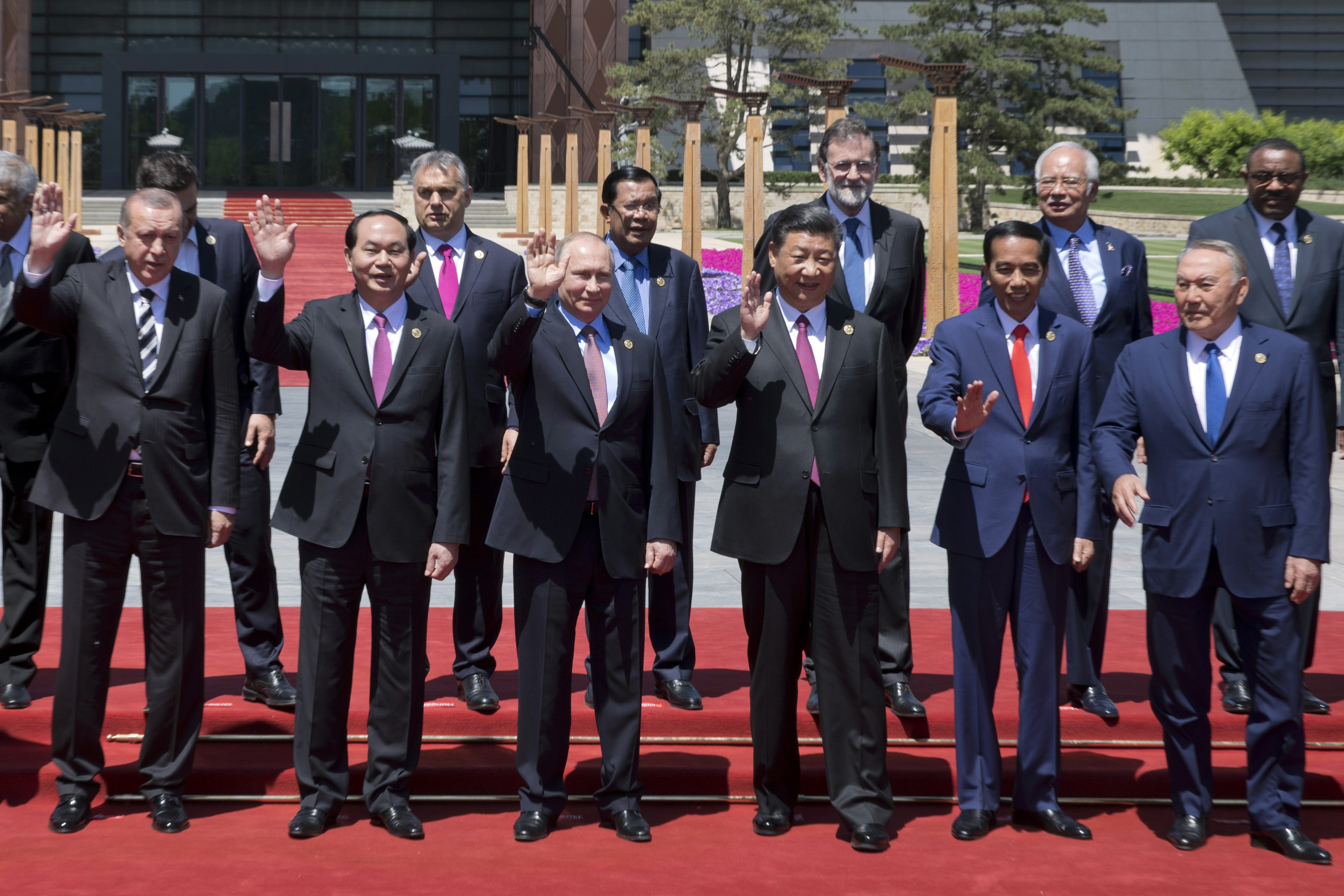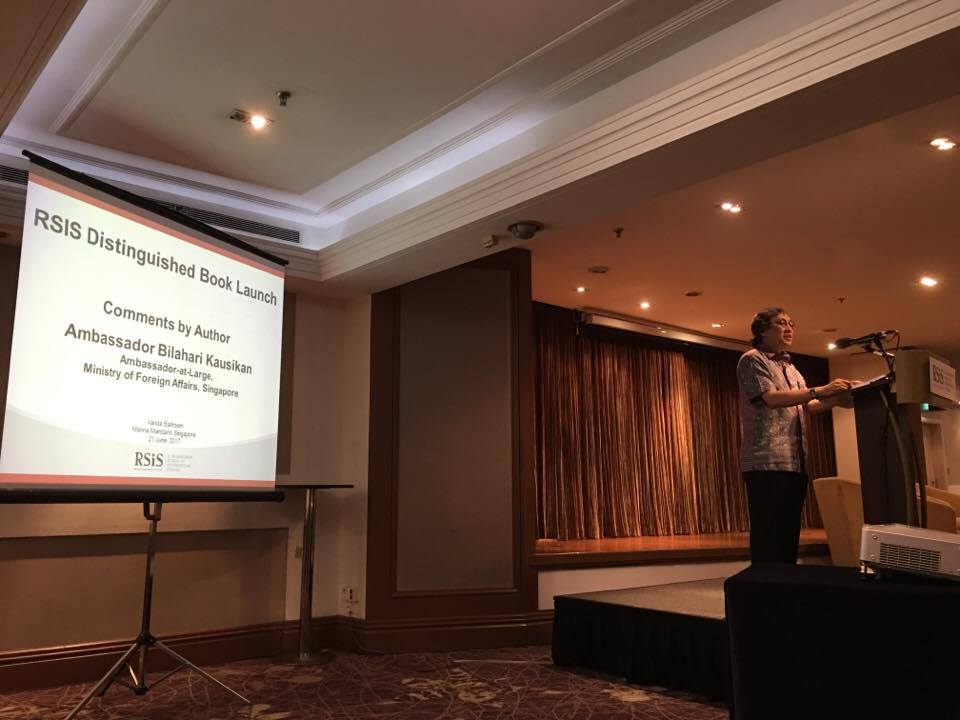Ambassador Bilahari Kausikan is currently Ambassador-at-Large at the Ministry of Foreign Affairs (MFA). Prior to this he was the Permanent Secretary of MFA from 2010 to 2013, and Second Permanent Secretary from 2001.
This is an edited excerpt of his remarks given at S. Rajaratnam School of International Studies Distinguished Book Launch on June 21. The book - "Singapore is Not an Island – Views on Singapore Foreign Policy" is a compilation of essays and public speeches by him over the last 25 years. .
The sub-headers were added by Mothership.sg for clarity.
Understanding Events Dispassionately Is Crucial
The world is in a phase of more than usual uncertainty and unpredictability and has been for some time. It is crucial that Singaporeans try to understand events dispassionately and with reference to our own national interests. We should not uncritically accept judgments which may be based on entirely different considerations.
This particularly so when we consider the new American administration. What happens in the United States has a profound influence on our region and the world. It is essential that we understand developments in that country clinically and independently.
In March this year I visited Washington DC and spoke to many old friends, mainly Asian experts of both parties. Few had anything good to say about the Trump administration. And if you read the American media you will get the impression that everything the new President has done is wrong: from the way he chooses to eat steak – which the Washington Post lampooned -- to his reaffirmation of the "One China Policy" which the New York Times depicted as weakness and a retreat. The European media and foreign policy experts have adopted similar attitudes.
Uncritical criticism can become a self-fulfilling prophesy. I do not mean to suggest that everything is honey and roses...But it is factually incorrect to suggest that nothing Mr Trump’s administration has done is right.
This is dangerous exaggeration. Uncritical criticism can become a self-fulfilling prophesy. I do not mean to suggest that everything is honey and roses. Certainly the cancellation of the TPP was a serious blow to American credibility, as was the disavowal of the Paris Agreement on climate change. The possible direction of American trade policy is deeply troubling, as is the perception that the administration may be Islamophobic.
But it is factually incorrect to suggest that nothing Mr Trump’s administration has done is right. Some of the criticism and mockery is downright irrelevant. So Mr Trump chooses to eat his steak well-done and with ketchup instead of, say, medium-rare and with Sauce Béarnaise. So what? And why was it wrong to reaffirm a policy that has stood since 1972?
What The Trump Administration Has Done Right
We should not let Mr Trump’s flamboyant personality and penchant for apparently spontaneous pronouncements get in the way of analysis. What the President tweets is good copy; what his administration does is more important. In East Asia, the Trump administration’s foreign and security policies have been within the general historical norm. This should not be surprising since the range of realistic options is not overly broad. Some aspects are improvements over previous policies.
I have already referred to the reaffirmation of the "One China Policy". The administration has also reaffirmed the importance of American alliances with Japan, South Korea and Australia. When he visited Indonesia earlier this year, Vice-President Pence announced that President Trump would attend the forthcoming APEC, EAS and ASEAN-US Summits. The 7th Fleet has not stopped operating in the South and East China Seas and recently conducted a freedom of navigation operation (FONOP) in the South China Sea, with the promise of more to come.
 SOUTH CHINA SEA - APRIL 8: In this handout photo provided by the U.S. Navy, the aircraft carrier USS Carl Vinson (CVN 70) transits the South China Sea on April 8, 2017. The Carl Vinson Carrier Strike Group is on a regularly scheduled Western Pacific deployment as part of the U.S. Pacific Fleet-led initiative to extend the command and control functions of U.S. 3rd Fleet. U.S Navy aircraft carrier strike groups have patrolled the Indo-Asia-Pacific regularly and routinely for more than 70 years. (Photo by Mass Communication Specialist 3rd Class Matt Brown/U.S. Navy via Getty Images)
SOUTH CHINA SEA - APRIL 8: In this handout photo provided by the U.S. Navy, the aircraft carrier USS Carl Vinson (CVN 70) transits the South China Sea on April 8, 2017. The Carl Vinson Carrier Strike Group is on a regularly scheduled Western Pacific deployment as part of the U.S. Pacific Fleet-led initiative to extend the command and control functions of U.S. 3rd Fleet. U.S Navy aircraft carrier strike groups have patrolled the Indo-Asia-Pacific regularly and routinely for more than 70 years. (Photo by Mass Communication Specialist 3rd Class Matt Brown/U.S. Navy via Getty Images)
It is not as if everything previous administrations did was correct. For example, the Obama administration’s policy of so-called “strategic patience” towards North Korea – a euphemism for doing almost nothing – was a serious mistake which gave Pyongyang eight years to develop its nuclear and missile capabilities. It was correct for the Trump administration to have deployed carrier strike groups to and near Korean waters in response to North Korean missile tests.
It is not as if everything previous administrations did was correct. For example, the Obama administration’s policy of so-called “strategic patience” towards North Korea – a euphemism for doing almost nothing – was a serious mistake which gave Pyongyang eight years to develop its nuclear and missile capabilities.
I do not think North Korea can be dissuaded from proceeding with its missile and nuclear programmes. Sooner or later North Korea will have nuclear-capable ICBMs that can reach the continental United States. But the Trump administration can hardly be held responsible for this. We are on the cusp of major strategic change in the Northeast Asian security environment. All the more important therefore to demonstrate resolve now through a show of over-whelming force so as to maintain deterrence in the not-too-distant future.
There are other examples of serious mistakes by previous administrations, both Democrat and Republican. There are also other instances where the Trump administration’s approach has, I think, been an improvement. It was a brilliant stroke to have launched an attack on Syria while at table with President Xi Jinping. It did much to ameliorate the impression of weakness and indecision when President Obama drew a red line over Syria’s use of chemical weapons but failed to enforce it.
 US President Donald Trump (R) and Chinese President Xi Jinping (L) prepare to shake hands during dinner at the Mar-a-Lago estate in West Palm Beach, Florida, on April 6, 2017. (JIM WATSON/AFP/Getty Images)
US President Donald Trump (R) and Chinese President Xi Jinping (L) prepare to shake hands during dinner at the Mar-a-Lago estate in West Palm Beach, Florida, on April 6, 2017. (JIM WATSON/AFP/Getty Images)
Advantage China - An Oversimplification
The attacks of the western media and foreign policy establishments on the Trump administration are often driven by their inability or unwillingness to come to terms with Mr Trump’s election. Some of it reflects political agendas of one sort or another. Such motivations may be understandable, but are none of our business.
Whatever we may think of their policies, Singapore must work with any American administration, just as we must work with any Chinese, Indian, Japanese, Russian, Indonesian, Malaysian, Thai or for that matter, if the need arises, Ethiopian government. We have to take the world as it is, irrespective of whether or not it suits our preferences or convenience.
The herd instinct is strong among the scribbling and chattering classes, and I think some of our own have succumbed to it. A fashionable trope is that the Trump administration’s abdication of leadership rebounds to China’s advantage. This is an oversimplification.
But the herd instinct is strong among the scribbling and chattering classes, and I think some of our own have succumbed to it. A fashionable trope is that the Trump administration’s abdication of leadership rebounds to China’s advantage. This is an oversimplification.
I do not think the Trump administration has forsworn leadership, although it has a different definition of leadership. In so far as there is a deficit of global leadership, Mr Trump’s election was a symptom not a cause, as was the election of Mr Obama before him. The current global order was fraying at its edges well before Mr Trump was elected. I do not think that China can easily fill a deficit of global leadership. And no matter what they may say, I think Chinese leaders know this.
“One Belt, One Road” Rests On Current Global Order
In January this year at Davos, President Xi delivered an eloquent defence of globalization. This was regarded as demonstrating China’s confidence and willingness to lead in place of America. But President Xi’s defence of globalization could also be read as a tacit admission that there is no alternative to the current American designed and led world order and concern over what it might mean for China should that order further unravel.
[related_story]
President Xi’s ‘One Belt, One Road’ (OBOR) is a bold and ambitious vision of great potential, worth supporting. But it is largely still only just that: a vision and not yet a reality. OBOR rests on the foundation of the current global order, as does China’s continued growth. It is not a substitute for the current global order. Can OBOR succeed if the current open, inter-connected global order crumbles and the world descends into protectionism?
 (Front row L-R) Turkey's President Recep Tayyip Erdogan, Vietnam's President Tran Dai Quang, Russian President Vladimir Putin, Chinese President Xi Jinping, Indonesia's President Joko Widodo and Kazakhstan's President Nursultan Nazarbayev pose for photographs during the Belt and Road Forum, at the International Conference Center in Yanqi Lake, north of Beijing, on May 15, 2017.
(Front row L-R) Turkey's President Recep Tayyip Erdogan, Vietnam's President Tran Dai Quang, Russian President Vladimir Putin, Chinese President Xi Jinping, Indonesia's President Joko Widodo and Kazakhstan's President Nursultan Nazarbayev pose for photographs during the Belt and Road Forum, at the International Conference Center in Yanqi Lake, north of Beijing, on May 15, 2017.
Chinese President Xi Jinping urged world leaders to reject protectionism on May 15 at a summit positioning Beijing as a champion of globalisation, as some countries raised concerns over his trade ambitions. (NG HAN GUAN/AFP/Getty Images)
To lead an open global order, one must oneself be open. The Chinese Communist Party is ambivalent over further opening and reform because it is unsure what the effect on its rule may be. So far the Party’s emphasis has been on tightening central control. And it is not as if China is without serious internal challenges of its own.
Rushing to judgement based on uncritical acceptance of other people’s assessments made for reasons that are irrelevant to Singapore could trap us in path dependencies that will be difficult to escape.
I hold no brief for any country except our own. It is not my intention to defend the Trump administration, any more than it is my intention to criticise the Trump administration or any other government.
The Trump administration is only six months old and events may well prove me wrong. But rushing to judgement based on uncritical acceptance of other people’s assessments made for reasons that are irrelevant to Singapore may lead to wrong policy choices. This could trap us in path dependencies that will be difficult to escape.
Singaporeans need to understand that the manipulation of public opinion by various means, covert and overt, has been tool of statecraft since time immemorial. The purpose is to pressure governments to change policies. International developments are often more complex than may appear. Hence the need for clear, balanced and independent judgments. That is my essential point which the pieces collected in this book are intended, however imperfectly, to illustrate.
Here are totally unrelated but equally interesting articles:
Here are 14 moving images of people crying because they’re so happy they just can’t
Quiz: What type of BBQ friend are you?
Top photo by Chan Cheow Pong
If you like what you read, follow us on Facebook, Instagram, Twitter and Telegram to get the latest updates.
